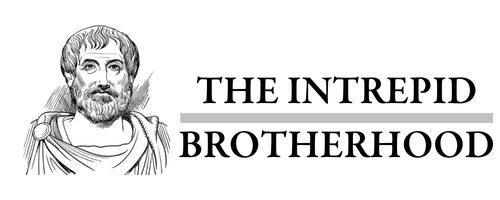All of the podcast hosts that I have interviewed with have asked me about my references to the Greek philosopher Aristotle in my book The Intrepid Brotherhood. Many readers have probably wondered about the same thing. When asked, I have tried to provide my interpretation of why the principles espoused by ancient Greek and Chinese philosophers are ingrained in the modern leadership practices that are effective and successful today. I never really know if I am qualified to explain the concept adequately, so …. I thought I would confuse the issue even more and write a blog about it!
There are countless books, articles, blogs, research papers, theses and dissertations on the application and meaning of the ethics espoused by ancient philosophers. In fact, I get a minimum of two per week on the subject from my subscription to Academia.edu. Consequently, it is too easy to get bogged down in the academic analysis of the application (or misapplication) of these teachings to today’s business environment. Fortunately, some of the authors have focused on what I believe is the real value of these ancient philosophies to our interactions in the workplace and, indeed, in life.
It seems that everyone who writes about Aristotle’s teachings on ethics focuses on the Greek word “arĕte”, which has traditionally been interpreted as “virtue”. So, we typically see Aristotle’s teachings referred to as “virtue ethics”, to which people have continuously tried to assign moral values. Morality is always interpreted subjectively and, since the emergence of major religions, has typically been subject to things like Christian doctrine. In other words, you cannot be ethical unless you fit the moral description of a certain religion.
But what if “arĕte” is better translated as “excellence”?
Aristotle wrote “we state the function of man to be a certain kind of life, and this to be an activity or actions of the soul implying a rational principle, and the function of a good man to be the good and noble performance of these, and if any action is well performed when it is performed in accordance with the appropriate excellence”.
Then the moral ramifications of Aristotle’s ethics can be better described as simply “performing well in the function of being human”, or “the proper state or condition for a human”. This interpretation lends itself better to translation into modern leadership practices.
The Learning Organization; Inspirational Leadership; Servant Leadership all share components that reflect these values that flow naturally from the “excellence ethics” interpretation:
Knowing thyself;
Continually assessing the worthiness of human deeds;
Intentionally striving for good by means of knowledge;
Looking beyond the immediate context to appreciate the impact of actions on others;
Fostering inquiry and dialogue.
Excellence in leadership may not be extremely easy to achieve, but the foundation is definitely there …… as well as the modern guidelines for improvement. It ‘aint rocket science (wink, wink).
Stay Courageous,
Gordon
